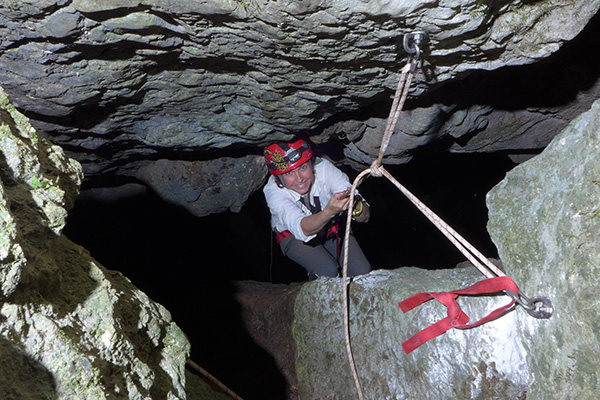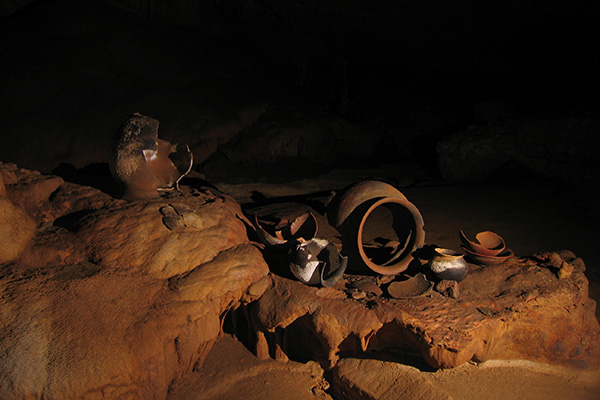
Most archaeologists have to dig in the field, but Professor Holley Moyes digs deeper than most. Her research takes her more than 400 feet into the Belize underground, where ancient Maya caves hold evidence of rituals to appease gods of fertility and rain.
 That research is the cover story in Discover Magazine’s December issue, which documents one of Moyes’ summer visits to Actun Tunichil Muknal, or “Cave of the Crystal Sepulchre,” near the southeast coast of the Central American country.
That research is the cover story in Discover Magazine’s December issue, which documents one of Moyes’ summer visits to Actun Tunichil Muknal, or “Cave of the Crystal Sepulchre,” near the southeast coast of the Central American country.
The cave is a complex system of chambers spanning 5 kilometers and is home to more than 1,000 Maya artifacts from the Classic Period (A.D. 700 to 900). The artifacts including sacrificial human remains, obsidian tools and ceramics — but it’s the pottery that’s of most interest to Moyes.
“What makes this cave so spectacular is that the artifacts were still right where the Maya left them,” Moyes said. “Because these cave chambers are so remote, it has kept the artifacts hidden from looters and curiosity seekers for more than 1,000 years.”
Moyes has spent the better part of two decades studying more than 100 caves in Belize and conducting intensive investigations in about half of them. Her research team includes UC Merced graduate students Marieka Arksey, Erin Ray, Shayna Hernandez, Nick Bourgeois and Pedro Carvajal – some of whom have been going to Belize every summer since they were undergrads.
Her interest in the caves isn’t just for her own academic pursuits, however — it’s also helping to preserve the history of the Maya culture. That’s why Moyes is welcome in these sacred areas and assisted by locals like Don Antonio and Cheech Mai, brothers who serve as guides while their wives and daughters cook for the team.
“It’s great because we are exploring their cultural heritage together,” Moyes said. “Their collaboration enables me to tell the story of the ancient Maya, which I consider an honor.”
Specializing in ancient Mesoamerica and the archaeology of religion, Moyes has a unique perspective on the history of Maya civilization. Her recent work sheds light on how ideology influences human decision making and how external influences affect political decision making, such as how drought might have led to the downfall of ancient Maya kingship in the Classic Period.
“I believe rulers in ancient Maya society co-opted caves to attain and maintain political power by gaining favor of deities through offerings and sacrifices,” she said, adding that cave rituals are still conducted today.
In 2012, Moyes published “Sacred Darkness: A Global Perspective on the Ritual Use of Caves,” in which she argued that deep cave spaces have been used all over the globe for rituals since the Paleolithic Era. The piece won a Choice review as an “Outstanding Title” in 2013. In addition to her field work in Belize, she’s also collaborating with cognitive science Professors Michael Spivey, Teenie Matlock and Rick Dale to figure out what makes caves sacred to humans.
The Discover Magazine article on Moyes’ research is available to paid subscribers. A photo gallery of the Belize trip can be viewed online for free.






